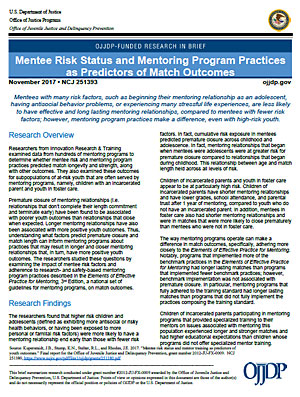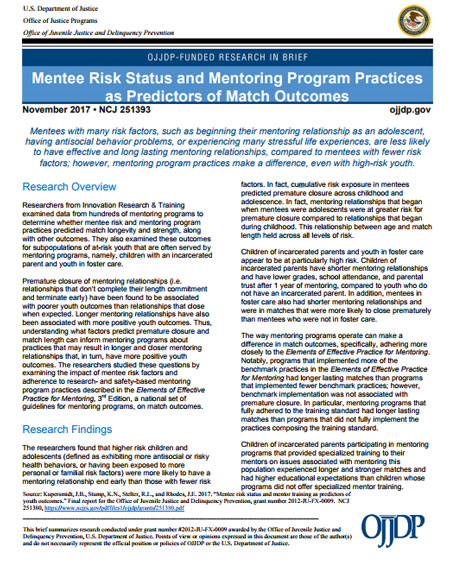OJJDP funds research studies to enhance knowledge about mentoring as a prevention strategy for youth who are at risk of involvement or who are already involved in the juvenile justice system. OJJDP expects that the results of these efforts will encourage more effective use of resources and enhance the quality of mentoring practices for youth.


One such study, conducted by innovation Research & Training, examined whether and how a youth’s risk level can predict the length of a mentoring relationship. The researchers also examined whether and how a program’s practices can predict the length of the relationship. These are important lines of inquiry because research has shown that long-lasting mentoring relationships are associated with more positive outcomes for youth compared to those that end prematurely, which are associated with negative outcomes.1
The researchers analyzed two large administrative datasets about mentors and mentees—MentorPRO used by MENTOR: The National Mentoring Partnership, and the Agency Information Management system used by Big Brothers Big Sisters (BBBS) of America. They also surveyed representatives from 45 BBBS affiliate agencies.
The researchers found that mentees who exhibited high-risk factors were statistically more likely than mentees with low-risk factors to be in mentoring relationships that ended prematurely, thus increasing the likelihood of harmful outcomes from the relationship for this already high-risk population. Risk factors for mentees include entering the mentoring relationship in adolescence, exhibiting a greater number of antisocial and risky health behaviors, and experiencing many stressful life experiences.
However, the researchers also found that programs that adhered to a greater number of practices from MENTOR’s Elements of Effective Practice for Mentoring could improve the chances of longer lasting matches. The Elements provide research-informed standards for creating and sustaining quality youth mentoring programs and meaningful mentoring relationships.
The findings from this research study suggest that high-risk youth pose a challenge for mentoring programs—these youth stand to benefit the most from a mentoring relationship but also are at unique risk for prematurely exiting the program and experiencing negative outcomes. However, the research also suggests that this challenge may be best mitigated when programs follow practices that have been shown by research to promote stronger, healthier mentoring relationships.
Resources:
For more information about this study and its findings, read the OJJDP-funded Research in Brief, Mentee Risk Status and Mentoring Program Practices as Predictors of Match Outcomes.
1 Grossman, J.B., and Rhodes, J.E. 2002. “The Test of Time: Predictors and Effects of Duration in Youth Mentoring Relationships.” American Journal of Community Psychology 30(2):199–219.
